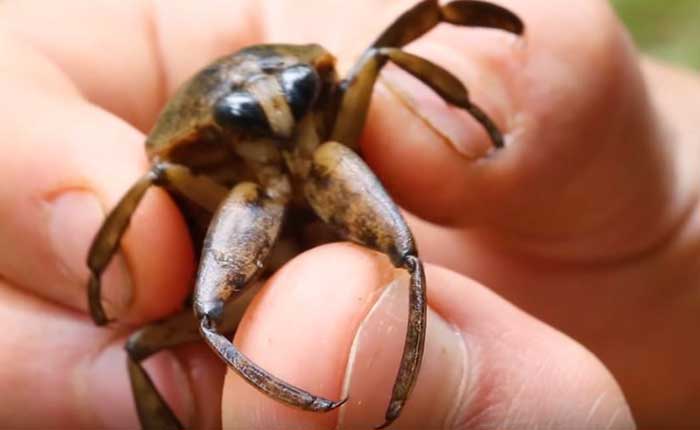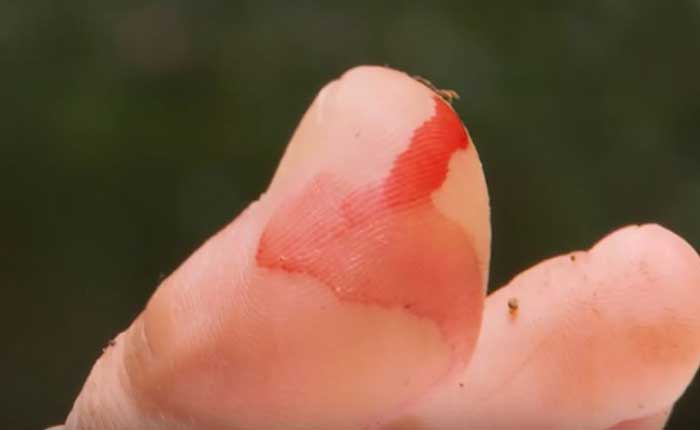Water bugs are known to produce painful bites and often cause allergic reactions to affected people. Although they have a nip, which is not dangerous, they are believed to deliver the most painful bites among all insects, which last for several hours. Find out more about the bite, pain scale, signs, remedies plus prevention measures
Table of Contents
Do Giant Water Bugs Bite?
Yes, these insects are known to bite both humans and prey. People working especially around wooden locations, rural areas, and wooded areas are most prone to these bites.
They remain motionless(play dead) in the water while waiting for prey then strike when they spot prey. They have a beak that has a little stout, which they use to inject toxic saliva that contains proteolytic enzymes.
Upon biting their prey, the enzyme liquefies tissues and causes paralysis of the victim. They after that grab their prey; fish, crustaceans, turtles, snakes, and on rare occasions, humans’ toes then inject their toxic saliva on the site of the bite. They later on suck, using their unique rostrum, and eat all meat from their prey
Water Bug Bite Pictures


Bug bite pain scale
According to Schmidt’s pain scale of insect stings, the pain felt has been organized in levels ranging from 1 to 4, with four being the most painful in these criteria.
The giant water bug is ranked at pain level 2. The duration of the pain lasts between five and ten minutes. The bites are considered painful and harmless.
On some occasions, the bites cause allergic reactions, and it is advisable to seek medical attention upon being bitten by a giant water bug.
Below is a video of a man who intentionally let a water bug bite him.
Are Giant Water Bugs Bites Poisonous to Humans?
Their bites are, however, harmless to human beings but are considered the most painful biting insects in the world. They are known to bite, especially when scared or terrified rarely.
Signs of Water Bug Bites
Upon infecting a victim, there are symptoms, which may cause none life threatening allergic reactions. Following are signs and symptoms that come along after toe biter bites you.
The initial symptoms include:
- Itching of the affected area
- Redness along the bitten area accompanied by bumps
- A mild burning sensation on the bitten region
- Feeling a provocating intense pain
- Minor swellings accompanied byexcruciating pain and mild or extreme oedema
Severe symptoms experienced by bite victims include:
- Having a fever
- Feeling nausea
- Having muscle cramps
- Having a rapid heart rate
- Having difficulty in breathing
- Having lumps or swellings found around lips and throat regions
- Loss of memory or confusion
Upon experiencing these signs and symptoms, a victim should seek immediate medical attention, especially when severe symptoms fail to subside.
How to deal with Giant Water Bug bites
Several methods are applicable, ranging from home remedies to medical treatment, which serves to counter the mild effects of water bug bites. The solutions include:
Home Remedies
- Washing the affected area with soap and water. The affected person should make a thick soap lather and smoothly rub it over the bitten surface repeatedly then leave the soap to rest for a few minutes without rubbing the surface, allowing the soap to dry. This method reduces itchiness and prevents skin infections.
- Using a paste containing baking soda and water. One should mix water with baking soda and create a thick paste then apply it on the affected area. The dough should be allowed to rest for an hour or more till it dries then later rinsed using cold water.
- Using Lemon Juice. A bitten person can dip cotton into lemon juice then gently rub the cloth onto the bitten area. This method is effective in reducing skin itchiness.
- Using Aloe Vera gel. One can apply aloe Vera gel on the affected region. Aloe Vera has antibiotic and antifungal properties that help prevent the development of secondary infections.
- Use of ice packs to reduce swellings
Other Remedies
- Application of over the counter steroid creams such as cortisone and 1% hydrocortisone. The creams reduce inflammation of the skin and itchiness that comes after biting. They should be applied for a week while following physician instructions
- Use of calamine lotions.
- The lotions are known to heal the skin and offer a soothing effect.
- Application of Antihistamines
- Antihistamines such as Diphenhydramine should be applied or consumed orally.
- Taking analgesic and anti-inflammatory drugs
- Drugs such as aspirin, Ibuprofen, and Naproxen have these properties and can be prescribed to an affected person since they are pain-relieving.
- Application of antibiotic ointments in the affected region.
- Having a tetanus immunization
- In cases of severe infections such as bleeding, discharge of pus, breathing problems, blisters, and mild allergic reactions, one should seek medical attention. Physicians can prescribe injections such as epinephrine, corticosteroid, or antihistamine to counter the effects.
Keeping Giant Water Bugs Away
Giant water bugs are aquatic creatures found in swimming pools, porches, and parking lots. It is essential to take precautionary measures to keep them away from homesteads. Some steps include:
- Reducing water sources around the home which prevents the spread of bugs.
- Removing standing water around gardens, yards, and other open areas.
- Provide a lighting system on gardens and yards to prevent bugs from infesting the regions. They like dark places.
- Applying insecticides on infected places, to remove them
- Covering oneself with clothes, hats, and protective gear when walking on bug-infested regions.
- Using bug repellant sprays and citronella candles in homesteads.
- Lastly, one can call an exterminator to get rid of these bugs permanently.
References
- https://en.wikipedia.org/wiki/Schmidt_sting_pain_index
- https://en.wikipedia.org/wiki/Belostomatidae
- https://www.newsweek.com/beware-giant-toe-biting-water-bugs-rangers-warn-1088848
Further Reading